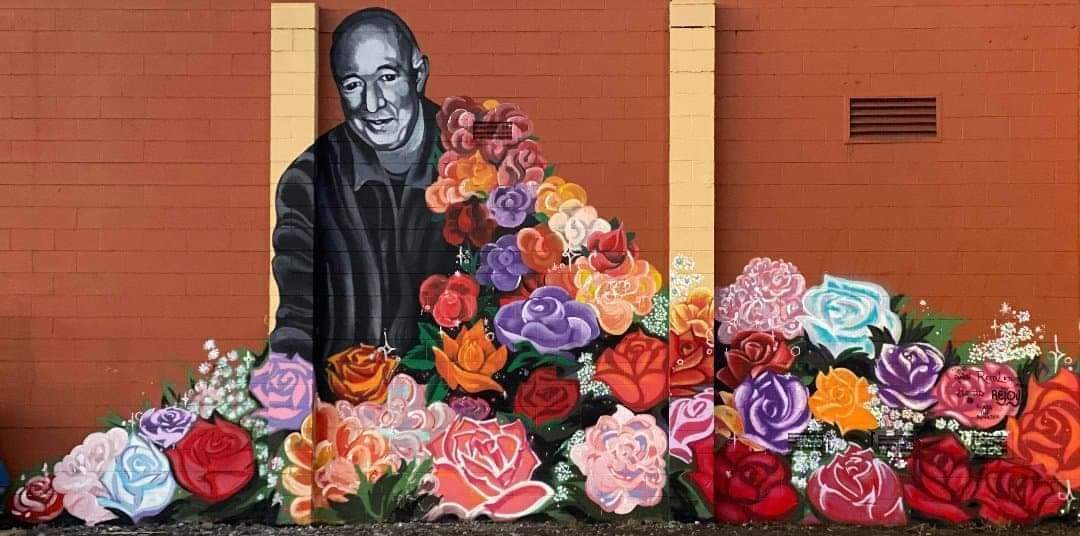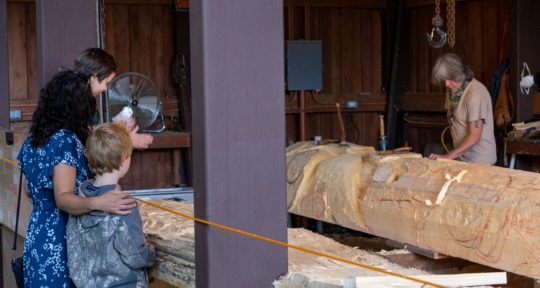For 45 years, Jean Jilwan was a staple of downtown Anchorage, Alaska. You’d be hard pressed to find someone who wasn’t familiar with Jilwan—though chances are, they only knew him by the moniker “The Flower Man.” Every night, Jilwan would walk between bars and restaurants in downtown Anchorage with a bucket of long stem roses, which he sold for $5 a piece.
While hawking goods to late-night revelers isn’t in itself unique, what made the first-generation Lebanese immigrant so well known in Alaska’s most populous city was his kindness, his ability to connect with everyone he met, and to seemingly be everywhere at once. It was hard to go out in Anchorage and not run into him.
“I think he had a transporter, he could just go from bar to bar faster than anyone else could,” says Garrett Perkins, a local artist. “I’d leave one bar he’d be involved in a sale at, get on my bicycle and go to another bar a couple blocks away, and he’d already be there involved in a different sale.”
Longtime downtown bartender Kyle Coryell says, “I saw [Jilwan] more often than my best friends, more often than my parents. It’s kind of crazy to think about.”
When Jilwan passed away at 67 years old on September 3, 2020, there was an outpouring of tributes to the man who’d over the years brightened downtown with his flowers and his personality. People ranging from Alaska newcomers to sourdough oldtimers shared stories about purchasing a rose from Jilwan in an attempt to (sometimes fruitfully, sometimes not) woo another bargoer. A handful of restaurants “saved” him a seat by placing a rose on the bar, bouquets were scattered around downtown, and petitions were raised to ask city politicians to find a way to commemorate Jilwan (one even called for a downtown statue of Captain Cook to be replaced with one of The Flower Man).
“I really liked him … I definitely miss him as a person,” says James Hoogenhous, a restaurant server in downtown Anchorage. “Nightlife just will never be quite the same without him.”


Memorial mural
While chatting over drinks and swapping memories shortly after Jilwan’s death, Perkins and Reed Leslie, a local tattoo artist, hatched a plan. They’d immortalize the downtown legend with a mural painted on one of the restaurants where he’d peddled his roses. This way, Jilwan’s image could continue to beautify the city for years to come.
“I really liked the idea from the beginning—the guy really did bring a whole lot to our community,” Leslie says, adding that over the years he’s heard “quite a few stories of people whose relationships started because they bought a flower from him.” (Leslie himself has bought many, often challenging women to “sword fights” with the roses.)
In the days that followed, the duo started an online fundraiser for painting supplies, rounded up a crew of fellow artists (Justin Parsons, Rejoy Armamento, and Shara Kay Diamond all pitched in), got permission from Jilwan’s family, and began asking area businesses if they could add some color to one of their exterior walls.
Ultimately, Mexican restaurant Pancho’s Villa was chosen as the final resting place for Jilwan’s likeness. “We were happy to say yes, we were actually honored that they’d asked,” says owner Carlos Gomez.

Over the course of a weekend in early October, the quintet of artists painted the mural on Pancho’s Villa, finishing just as the first snowfall of the season began. The piece depicts a black-and-white Jilwan bathed in a flood of red, pink, peach, purple, white, and blue impressionistic roses.
Perkins says that people have told him that despite not having been out in downtown Anchorage for a few decades, when they saw the mural, they immediately knew who it was meant to represent.
“He was a really sweet guy and he did some really amazing things, just in how he brought the community together here in Anchorage,” Perkins says. “He was well known and well liked. This is just our way to remember him.”
A special person
In the 20 years that Pancho’s Villa has been open, Jilwan popped in at least once—and sometimes two or three times—each night to sell his flowers, regardless of the weather. Gomez recalls how Jilwan would make a point to visit with all the employees, from the bartenders in the front to the dishwashers in back. He could remember minute details about the lives of those he encountered, but rarely called anyone by their given name. He had nicknames for everyone he saw frequently: Perkins was “Goat” because of his spiked earrings, and Leslie was “Shorty,” even though he’s exceptionally tall.
Gomez says that for many regulars at Pancho’s Villa, their meal wasn’t complete unless they left with a rose—something Jilwan knew and made a point to remember. But, according to Gomez, he never pushed a sale.
“He could read people so well, it always amazed me,” Gomez says, adding that Jilwan seemed to have a sixth sense, an ability to tell who wanted to engage in conversation and who wanted to be left alone with their dinner. “Whether it was something he learned over the years or it was a gift, it’s hard to say,” Gomez says. “Either way, he was a special person.”
If you go
The mural is located on the side of Pancho’s Villa in downtown Anchorage, Alaska.






